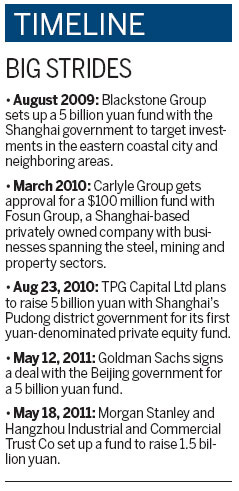Waiting for the yuan boost
Updated: 2011-06-10 10:26
By Hu Haiyan (China Daily European Weekly)
Foreign PE companies keen on tapping growing market for renminbi funds

Foreign private equity (PE) companies are expected to set up more yuan funds to tap the growing number of cash-rich institutions and wealthy individuals in China and also for improved market access.
Currently, foreign PE firms lag far behind their Chinese counterparts in the yuan fund-raising race, but experts feel that the entry of more players will add zing to the market. Global PE companies like Blackstone Group LP, Morgan Stanley, Goldman Sachs, Carlyle Group LP and TPG have already started yuan funds in China and will be joined by another PE firm, Bain Capital.
Wang Lihong, managing director of Bain Capital Asia, says his company will set up a yuan-denominated fund in two years.
Goldman recently signed a deal with the Beijing government for a 5 billion yuan (540 million euros) fund, while Morgan Stanley opened a 1.5 billion yuan fund with a partner in Hangzhou last month.
"There are many reasons why foreign private-equity funds may set up yuan funds. By setting up a yuan fund, foreign funds expect to gain more access to the abundant local capital," says Liu Jipeng, director of the Capital Research Center at the China University of Political Science and Law.
Another major draw for PE firms is the growing number of affluent people in China. There were at least 960,000 millionaires with personal wealth of 10 million yuan or more on the mainland, says a GroupM Knowledge finding, published by the Hurun Wealth Report 2011. The number represents a 9.7 percent increase over 2010.
"As there are more rich people in China, there are a growing number of Chinese limited partners (LPs) investing in funds. Most of the Chinese investors can only invest in yuan, the local currency. By setting up yuan funds, foreign funds can get access to these new categories of investors," Liu says.
Li Xunlei, chief economist of Goutai Junan Securities, says that China's vast market has drawn many world investment giants to the country's burgeoning private equity sector. "The allure of raising a local currency yuan fund is strong for global private equity firms. By setting up yuan funds, foreign PE firms can hope to get similar treatment like local funds. It would also provide them an opportunity to get around some of the complicated procedures that exist in China for foreign funds. At the same time, it will also help them to invest in industries where 'speed of accomplishing an investment is important'."
Andre Loesekrug-Pietri, managing partner of A-capital, a private equity fund for Chinese investments into Europe, says that it is a positive trend as "it allows general partners (GPs) to access more LPs, the growing number of Chinese institutional and family investors, and foreign GPs to have more exits options".
Loesekrug-Pietri, however, admits that there are still some gray areas that need answers. For instance, it is still not clear whether foreign funds will be considered as local investors.
"It is possible that by setting up yuan funds, the PE firms get access to local currency, but they are still considered as foreign investors, which means that the investment scope is limited and sectoral access restricted," he says.
The foreign yuan funds may face stiff competition from Chinese funds.
"Foreign funds have to cope with local PE funds, who are getting better in management experiences. They also have more local connections, more local support and better local understanding, which is very difficult to beat," Loesekrug-Pietri says.
"Foreign PE funds have a premium compared with Chinese funds. Generally speaking, they have a more disciplined investment approach and are more experienced," he says.
"Yuan funds come with many advantages for foreign PE firms. But they also need to provide a clear explanation of when they use the dollar and when they use the yuan and the strategy for return on investment," says Charles-Edouard Boue, the Asia president for Roland Berger Consultants.
Boue says the Chinese private equity industry is also galloping ahead. "As more and more foreign funds set up yuan funds, the Chinese investors will have more investment opportunities."
E-paper

Pret-a-design
China is taking bigger strides to become a force in fashion.
Lasting Spirit
Running with the Beijingers
A twist in the tale
Specials

My China story
Foreign readers are invited to share your China stories.

Mom’s the word
Italian expat struggles with learning English and experiences the joys of motherhood again.

Lenovo's challenge
Computer maker takes on iconic brand apple with range of stylish, popular products
